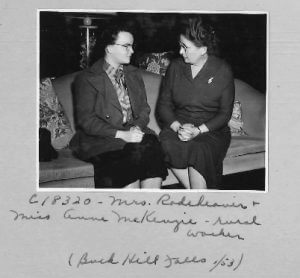
Board of Missions of the Methodist Church , “Mission Photograph Album - Portraits #08 Page 0036,” UMC Digital Galleries, accessed November 27, 2018, http://catalog.gcah.org/omeka/
items/show/60815.
Deaconess Leading Rural Ministry
Ann McKenzie’s entry into ministry matches that of many women who chose to become deaconesses in The Methodist Church. When she heard about women doing church work, nothing was said about ordination – women could not be full members of annual conferences at that time, and no one mentioned mission work; the focus was on being assistants to others in ministry. But she heard the call and answered it, attending Scarritt and becoming a commissioned deaconess in 1948.
Her first position as a rural worker was with an elderly country preacher who served small churches. She was the only such worker in her conference, so she had not colleagues with whom to discuss her experiences. After the preacher retired, she moved to a new assignment – seven churches on the other side of the conference. Her pay was low, as it was for most deaconesses, but she often was invited to a Sunday dinner along with the preacher. Her days were varied. One day a parishioner invited her to bring her laundry along; together the two tackled the chores of washday. As they were hanging out the clothes, they discussed some of the issues before them, particularly the need for Sunday school rooms. They decided to approach one of the women in the church who had some land to see if they could use it for the Lord’s Acre program.
Under this program, farmers could devote part of their crop (an acre or more) to God, sell the harvest, and give the proceeds to the church. Informally they talked with various people in the church about what they could donate to help the project. As McKenzie tells it, women talked to their husbands, who then thought it was all their own idea and helped do the work. They grew cotton, selling enough to be able to make the money they needed for the Sunday school rooms. Word got around about this project, and other churches tried the idea, achieving success as well.
She spent six years at that assignment, with the help of a US-2 (a volunteer spending two years in mission in the U.S.) the last two years. Then she moved on to Wayne County, Tennessee. One of her new churches had never had a vacation Bible school. So she nominated three men to run it. After she explained to them what they were supposed to do, they went around and visited all the families, so that one hundred children participated in this first-ever program in the community.
McKenzie’s work with rural churches continued throughout her years of ministry. She claimed she got to know the power company very well because she paid many a bill for poor parishioners. But not all were poor. She took youth on trips to Methodist mission projects where they slept on the floor, cooking their own meals. Her stories and work typify that of many rural workers—day-in, day-out identification with people and their needs, willingness to take on a variety of responsibilities and tasks, and creativity in facing all sorts of situations and problems.
Taken from Linda Gesling, Mirror and Beacon: The History of Mission of The Methodist Church, 1939-1968. (New York: General Board of Global Ministries, The United Methodist Church, 2005), p. 60-61.




